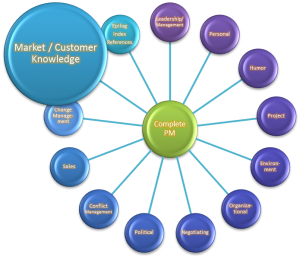 Success in the market place is the usual source of positive cash flow. Successful projects bring vitality into an organization. As a key contributor to these outcomes, project managers are well advised to be aware of what is happening in the market and make appropriate decisions that positively influence the cash flow resulting from project outcomes. Although new product development projects are clearly linked to the market, most project outcomes end up in the market in one form or another. In the case of internal projects, the customer may be another department or division in the same organization. The end-user—the person who finally benefits from the project outcome—will be the customer of the project.
Success in the market place is the usual source of positive cash flow. Successful projects bring vitality into an organization. As a key contributor to these outcomes, project managers are well advised to be aware of what is happening in the market and make appropriate decisions that positively influence the cash flow resulting from project outcomes. Although new product development projects are clearly linked to the market, most project outcomes end up in the market in one form or another. In the case of internal projects, the customer may be another department or division in the same organization. The end-user—the person who finally benefits from the project outcome—will be the customer of the project.
We must never forget that customers pay the bills and our salaries. Bosses, of course, are important to our well-being and futures, but if customers go away or stop doing business with us, everybody suffers. Some people say there is only one true customer and that is the final purchaser of the outcome who pays real money for the product or service. We say there are internal customers as well who depend on project outputs and outcomes. Complete project managers have an obligation to attend to all customers.
Project managers, as servant leaders, need a good knowledge of the customer and of the market for project outcomes if they are to be truly successful. Understanding competitive forces in the market is a key aspect of this knowledge. The need is to focus on marketing and customer issues most important to the complete project manager: determining who potential customers are and what they want; learning who the competitors are and what they are offering; understanding the trade-offs among product performance attributes of benefits, features, and price; and determining the ideal timing for market introduction. In this context it is also important to pay attention to organizational ethics and its important role in the interface among executives, employees, competitors, and clients.
Generally speaking, customers need project outcomes in areas such as solving a problem or issue, launching a product, or upgrading a system. A first step to generating revenue is to design products, services, or processes that help customers solve their problems and meet or exceed customer’s expectations. This happens through projects. Customer demand is also influenced by the total market demand, and a company’s share of that market is influenced by both the project outcome and project duration.
Develop skills for interacting with challenging customers. Stay professional during issue escalations as a means to preserve relationships and keep customers satisfied. Remember that serving customers is the purpose for most project work.
Randy Englund, Englund Project Management Consultancy, www.englundpmc.com
